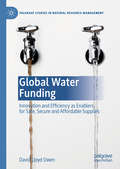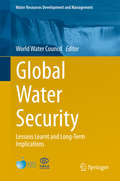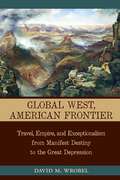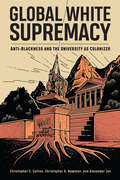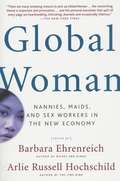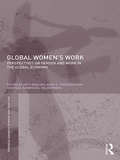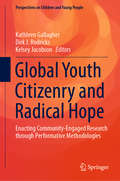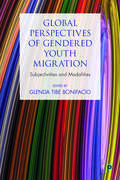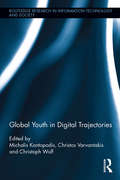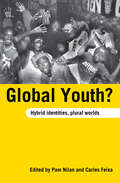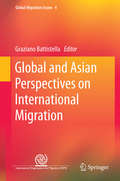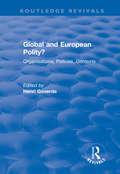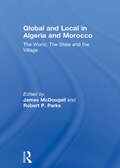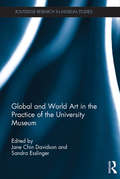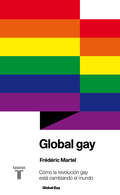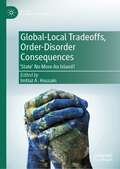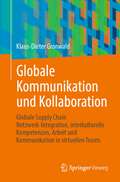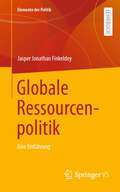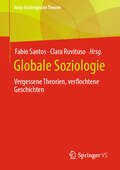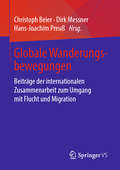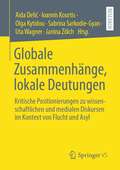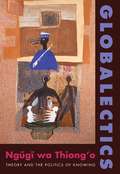- Table View
- List View
Global Water Funding: Innovation and efficiency as enablers for safe, secure and affordable supplies (Palgrave Studies in Natural Resource Management)
by David Lloyd OwenIs safe and sustainable water and sanitation for all an unaffordable pipedream? This book surveys the worldwide development of water and sewage services and the challenges in meeting Sustainable Development Goal 6 (SDG6) along with climate change, population growth and urbanisation. It explores the reasons why current SDG6 progress is failing, including weak policy implementation, staff shortages and inadequate funding, as well as the limited impact of aid funding. The author contends that despite a series of innovations, debt finance remains too small to address needs of developing economies. Therefore, instead of advocating new funding, this book proposes addressing the funding gap through technological innovation and more efficient management and procurement through a series of examples that have challenged traditional assumptions. After four decades of good intentions, SDG6 is making a difference in monitoring shortfalls for the first time, allowing for more effective responses. This book outlines the role of innovation in hardware development, procurement and installation, and discusses how network management and operations can most effectively address funding gaps. The potential for savings is considerable, if effectively replicated. New approaches are driving forward affordable resilience, including nature-based solutions such as upstream habitat enhancement to retain water and improve downstream water quality; the circular economy, including water, nutrient, energy and heat recovery from wastewater; and demand management. This book will be of great value to scholars, policy makers and practitioners interested in the global finance of sustainable water and sanitation.
Global Water Security
by World Water CouncilThis book highlights the relationship between the water sector and various other sectors in order to establish an improved understanding of the importance of water resources as an essential cross-cutting vector of socio-economic development. The book is both policy and practice oriented and is not constrained by existing definitions on water security. It includes actual experiences of policy, management, development and governance decisions taken within the water sector, and examples on how these have affected the energy and agricultural sectors as well as impacted the environment, and vice versa, as appropriate. It also discusses trade-offs, short and long-term implications, lessons learnt, and the way forward. The book includes case studies on cities, countries and regions such as Australia, China, Singapore, Central Asia, Morocco, Southern Africa, France, Latin America, Brazil and California.
Global West, American Frontier: Travel, Empire, and Exceptionalism from Manifest Destiny to the Great Depression (Calvin P. Horn Lectures in Western History and Culture Series)
by David M. WrobelThis thoughtful examination of a century of travel writing about the American West overturns a variety of popular and academic stereotypes. Looking at both European and American travelers&’ accounts of the West, from de Tocqueville&’s Democracy in America to William Least Heat-Moon&’s Blue Highways, David Wrobel offers a counter narrative to the nation&’s romantic entanglement with its western past and suggests the importance of some long-overlooked authors, lively and perceptive witnesses to our history who deserve new attention. Prior to the professionalization of academic disciplines, the reading public gained much of its knowledge about the world from travel writing. Travel writers found a wide and respectful audience for their reports on history, geography, and the natural world, in addition to reporting on aboriginal cultures before the advent of anthropology as a discipline. Although in recent decades western historians have paid little attention to travel writing, Wrobel demonstrates that this genre in fact offers an important and rich understanding of the American West—one that extends and complicates a simple reading of the West that promotes the notions of Manifest Destiny or American exceptionalism.Wrobel finds counterpoints to the mythic West of the nineteenth century in such varied accounts as George Catlin&’s Adventures of the Ojibbeway and Ioway Indians in England, France, and Belgium (1852), Richard Francis Burton&’s The City of the Saints (1861), and Mark Twain&’s Following the Equator (1897), reminders of the messy and contradictory world that people navigated in the past much as they do in the present. His book is a testament to the instructive ways in which the best travel writers have represented the West.
Global White Supremacy: Anti-Blackness and the University as Colonizer
by Christopher S. Collins Alexander Jun Christopher B. NewmanKnowledge is more expansive than the boundaries of the Western university model and its claim to be the dominant—or only—rigorous house of knowledge. In the former colonies of Europe (e.g., South Africa, Brazil, and Oceania), the curriculum, statues, architectures, and other aspects of the university demonstrate the way in which it is a fixture in empire maintenance. The trajectory of global White supremacy is deeply historical and contemporary—it is a global, transnational, and imperial phenomenon. White supremacy is sustained through the construction of inferiority and anti-Blackness. The context, history, and perspective offered by Collins, Newman, and Jun should serve as an introduction to the disruption of the ways in which university and academic dispositions have and continue to serve as sites of colonial and White supremacist preservation—as well as sites of resistance.
Global Woman
by Arlie Russell Hochschild Barbara Ehrenreich<P>In a remarkable pairing, two renowned social critics offer a groundbreaking anthology that examines the unexplored consequences of globalization on the lives of women worldwide. <P>Women are moving around the globe as never before. But for every female executive racking up frequent flier miles, there are multitudes of women whose journeys go unnoticed. Each year, millions leave Mexico, Sri Lanka, the Philippines, and other third world countries to work in the homes, nurseries, and brothels of the first world. This broad-scale transfer of labor associated with women's traditional roles results in an odd displacement. <P>In the new global calculus, the female energy that flows to wealthy countries is subtracted from poor ones, often to the detriment of the families left behind. The migrant nanny-- or cleaning woman, nursing care attendant, maid-- eases a "care deficit" in rich countries, while her absence creates a "care deficit" back home. <P>Confronting a range of topics, from the fate of Vietnamese mail-order brides to the importation of Mexican nannies in Los Angeles and the selling of Thai girls to Japanese brothels, "Global woman offers an unprecedented look at a world shaped by mass migration and economic exchange on an ever-increasing scale. In fifteen vivid essays-- of which only four have been previously published-- by a diverse and distinguished group of writers, collected and introduced by best selling authors Barbara Ehrenreich and Arlie Russell Hochschild, this anthology reveals a new era in which the main resource extracted from the third world is no longer gold or silver, but love.
Global Women's Work: Perspectives on Gender and Work in the Global Economy (Routledge IAFFE Advances in Feminist Economics)
by Mary E. Frederickson Beth English Olga Sanmiguel-ValderramaThis volume considers how women are shaping the global economic landscape through their labor, activism, and multiple discourses about work. Bringing together an interdisciplinary group of international scholars, the book offers a gendered examination of work in the global economy and analyses the effects of the 2008 downturn on women’s labor force participation and workplace activism. The book addresses three key themes: exploitation versus opportunity; women’s agency within the context of changing economic options; and women’s negotiations and renegotiations of unpaid social reproductive labor. This uniquely interdisciplinary and comparative analysis will be crucial reading for anyone with an interest in gender and the post-crisis world.
Global Youth Citizenry and Radical Hope: Enacting Community-Engaged Research through Performative Methodologies (Perspectives on Children and Young People #10)
by Kathleen Gallagher Dirk J. Rodricks Kelsey JacobsonThis book explores the affective and relational lives of young people in diverse urban spaces. By following the trajectories of diverse young people as they creatively work through multiple and unfolding global crises, it asks how arts-based methodologies might answer the question: How do we stand in relation to others, those nearby and those at great distances? The research draws on knowledges, research traditions, and artistic practices that span the Global North and Global South, including Athens (Greece), Coventry (England), Lucknow (India), Tainan (Taiwan), and Toronto (Canada) and curates a way of thinking about global research that departs from the comparative model and moves towards a new analytic model of thinking multiple research sites alongside one another as an approach to sustaining dialogue between local contexts and wider global concerns.
Global Youth Migration and Gendered Modalities: Subjectivities and modalities
by Glenda Tibe BonifacioYouth migration is a global phenomenon, and it is gendered. This collection presents original studies on gender and youth migration from the 19th century onwards, from international and interdisciplinary perspectives. An international group of contributors explore the imperial histories of youth migration, their identities and sexualities, the impact of education, policies and practices, and the roles, contribution and challenges of young migrants in certain industries and services, as well as in communities. These cross-disciplinary themes include cases from Albania, Bangladesh, Canada, Ethiopia, France, Hungary, Italy, Philippines, Senegal, Syria, Turkey, the United Kingdom and the United States.
Global Youth Protest, Climate and Education (Global Dissent)
by Jennifer LaurenThis text explores how to design, implement and sustain processes to meaningfully engage youth and marginalised populations in local and multilateral decision-making.Drawing on perspectives from across regions, generations and disciplines, the book balances research, advocacy and practice to provide a critical reflection on the mainstreaming of youth participation into the levers of systems change. Prompted by the breadth and scope of youth climate protest action, these narratives ignite new pathways for building trust and improving civic participation in achieving institutional change. The authors in this collection lean into the tensions and breakthroughs emerging in and from these sites of transition and potential transformation.The book is written by and for activists, students, scholars and practitioners from around the world. This multidisciplinary work is a refreshing and indispensable guide for undergraduate and graduate students interested in civic participation, youth development and livelihoods, climate action, global development, social movements and multilateral cooperation.
Global Youth in Digital Trajectories (Routledge Research in Information Technology and Society)
by Christoph Wulf Michalis Kontopodis Christos VarvantakisGlobal Youth in Digital Trajectories explores the most recent developments regarding youth and media in a global perspective. Representing an innovative contribution to virtual research methods, this book presents research carried out in areas as diverse as Greece, the Netherlands, Germany, Brazil, Russia, and India. The volume examines which new anthropological, and cultural-historical conditions and changes arise in connection with the widespread presence of digital media in the lives of the networked teens. Indeed, it is highlighted that the differentiation between an offline world and an online world is inapplicable to the lives of most young people. Exploring youth’s imaginary productions, personal sense-making processes and cross-media dialogues in today’s multimedia worlds, Global Youth in Digital Trajectories will be of particular interest to undergraduates and postgraduates in the fields of sociology, anthropology, education studies, media research and cultural studies. It may also appeal to practitioners in social work and schools. URL for circulation: www.routledge.com/9781138236035
Global Youth?: Hybrid Identities, Plural Worlds
by Pam Nilan Carles FeixaThis innovative collection of studies by international youth researchers, critically addresses questions of ‘global’ youth, incorporating material from regions as diverse as Sydney, Tehran, Dakar and Manila, and advancing our knowledge about young people around the globe. Exploring specific local youth cultures whilst mediating global mass media and consumption trends, this book traces subaltern ‘youth landscapes’ and tells subaltern ‘youth stories’ previously invisible in predominantly western youth cultural studies and theorizing. The chapters here serve as a refutation of the colonialist discourse of cultural globalization. Showcasing previously unpublished youth research from outside the English-speaking world alongside the work of well-known researchers such as Huq and Holden, these accounts of youth cultural practices highlight much that is predictably different, but also a great deal of common ground. This book goes inside creative cultural formation of youth identities to critically examine the global in the local. Bringing together an internationally diverse group of researchers, who describe and analyze youth cultures throughout Europe, the Americas, Asia, Africa and Oceania, this volume presents the first comprehensive review of global youth cultures, practices and identities, and as such is a valuable read for students and researchers of youth studies, cultural studies and sociology.
Global and Asian Perspectives on International Migration
by Graziano BattistellaThis volume examines key aspects of the migration process that are particularly relevant in the Asian context. It looks into established concepts and theoretical propositions that have found application in other areas, particularly in the West and explores their validity and relevance in understanding the realities of migration in Asia. Global and Asian Perspectives on International Migration features the perspectives of scholars from Asia and other parts of the world, as well as diverse backgrounds. It presents a variety of forms, directions, policies and institutions, including circular and temporary migration; the management of cultural diversity; the gender perspective on migration in North America, Europe and Asia; returning migrants; migration governance in the ASEAN economic community; and the determinants of migration. In conclusion, the book explores migration transition in Asia and revisits select theories in light of recent evidence. With its dialogic approach to migration in Asia by renowned authors from various regions and disciplines, this book will serve as a valuable resource to policy makers in research and academia, civil society, international organizations and the private sector.
Global and European Polity?: Organisations, Policies, Contexts
by Henri GoverdeThis title was first published in 2000: The contents of this text are structured by three sub-themes. Firstly, the internationalization of Europe. This field studies threats and chances of re-institutionalization of nation-state societies and the role of the public sector therein, acknowledging the dynamics of the ever-changing international political and economic relations. The second sub-theme is the creative firm in a European context. The object of this field is the conditions for innovative organization and management of firms in Europe, taking into account the necessary adjustments to emerging European political and economic transformations. The final sub-theme is innovative environmental and spacial policy in a European context. This section has its object in the far-reaching transformations that European societies and particularly the Dutch societies are witnessing. These transformations concern the functional relations and spatial and environmental conditions as well as the emerging changes in the way planning and policy institutions deal with their new targets.
Global and International History: Anti-Imperial Metropolis
by Michael GoebelThis book traces the spread of a global anti-imperialism from the vantage point of Paris between the two World Wars, where countless future leaders of Third World countries spent formative stints. Exploring the local social context in which these emergent activists moved, the study delves into assassination plots allegedly hatched by Chinese students, demonstrations by Latin American nationalists, and the everyday lives of Algerian, Senegalese and Vietnamese workers. On the basis of police reports and other primary sources, the book foregrounds the role of migration and interaction as driving forces enabling challenges to the imperial world order, weaving together the stories of peoples of three continents. Drawing on the scholarship of twentieth-century imperial, international and global history as well as migration, race and ethnicity in France, it ultimately proposes a new understanding of the roots of the Third World idea.
Global and Local in Algeria and Morocco: The World, The State and the Village
by James McDougall and Robert P. ParksThis book brings together contributors across the disciplines to examine the local, national, regional and global processes that have shaped Maghribi societies, economies and politics since the colonial period.Focusing equally on the local shape of global processes and on the broader significance of particular ‘ways of doing things’, these studies move beyond generalisations about globalisation and its impact on local societies, whether developmental or detrimental, of the ‘global in the local’, or of ‘glocalisation’. Cases range from the onset of the ‘first wave’ of globalisation in the colonial era to the most recent developments in identity politics, consumerism, and telecommunications. Contributors show how nationalising and globalising influences are seized, remade, and put to work in very different ways by High Atlas farmers or urban real estate speculators, human rights activists at the edge of the Sahara and amateur theatre actors in Mediterranean towns. Always located somewhere, these social actors nonetheless act in different ways, with different effects, at different levels of engagement, whether with each other, their own governments, or the wider world.This book was published as a special issue of the Journal of North African Studies.
Global and World Art in the Practice of the University Museum (Routledge Research in Museum Studies)
by Jane Chin Davidson Sandra EsslingerGlobal and World Art in the Practice of the University Museum provides new thinking on exhibitions of global art and world art in relation to university museums. Taking The Fowler Museum at UCLA, USA, as its central subject, this edited collection traces how university museum practices have expanded the understanding of the ‘art object’ in recent years. It is argued that the meaning of cultural objects infused with the heritage and identity of ‘global culture’ has been developed substantially through the innovative approaches of university scholars, museum curators, and administrators since the latter part of the twentieth century. Through exploring the ways in which universities and their museums have overseen changes in the global context for art, this edited collection initiates a larger dialogue and inquiry into the value and contribution of the empirical model. The volume includes a full-colour photo essay by Marla C. Berns on the Fowler Museum’s ‘Fowler at Fifty’ project, as well as contributions from Donald Preziosi, Catherine M. Cole, Lothar von Falkenhausen, Claire Farago, Selma Holo, and Gemma Rodrigues. It is important reading for professionals, scholars and advanced students alike.
Global gay
by Frédéric MartelUna investigación sin precedentes alrededor del mundo sobre la cuestión gay. De una esquina a otra del planeta, la revolución gay está en marcha. De la resistencia contra la represión en China, Cuba o Irán al activismo a favor del matrimonio para parejas del mismo sexo en Estados Unidos y en Europa. De lo underground al mainstream. De la criminalización de la homosexualidad a la criminalización de la homofobia. Durante cinco años Frédéric Martel ha llevado a cabo un estudio sin precedentes en cuarenta y cinco países, desde los más abiertos a los más hostiles, reuniéndose con centenares de actores de esta revolución. A través de ese novedoso prisma, este libro dibuja una verdadera geopolítica de la globalización gay analizando los cambios en los modos de vida, la redefinición del matrimonio, la emancipación paralela de las mujeres y los homosexuales o el impacto decisivo que han supuesto Internet y las redes sociales. Aunque se desarrollen bajo una misma bandera, las singularidades de la vida local y la ausencia de homogeneidad de las comunidades gays de todo el mundo son fascinantes. Martel descubre que la globalización no se traduce necesariamente en uniformización: la diversidad es infinita. Como termómetro de la evolución de las mentalidades, la cuestión gay se ha convertido en un valioso criterio para juzgar el estado de una democracia y la modernidad de un país. Este libro, rico en retratos y testimonios sorprendentes, cuenta este nuevo frente en el que ahora se libra la batalla por los derechos del hombre. Reseñas:«Libro-investigación que se lee como una historia que cuenta la nueva batalla de los derechos humanos.»Slate «La homosexualidad presenta mil caras distintas en todo el mundo y este formidable ensayo sociológico sobre la revolución gay firmado por Frédéric Martel ofrece una síntesis esclarecedora.»Le Point «Cuando Frédéric Martel dice que se ha propuesto averiguar cómo funciona un fenómeno de masas, va en serio. Quiere decir que va a pasar años viajando por una cincuentena de países de todo el mundo, que va a entrevistar a miles de personajes pequeños y grandes y va a escribir un libro con conclusiones a las que pocos hemos llegado antes.»ICON
Global-Local Tradeoffs, Order-Disorder Consequences: 'State' No More An Island? (Global Political Transitions)
by Imtiaz A. HussainIn this book, ten substantive chapters examine how collisions between technological developments (globalizing forces) and thickening populist pressures (localizing dynamics) constantly keep reinventing the state in unforeseen and unpredictable ways. We learn of how international organizations have fared, and to what extent grass-roots grumbles have impacted big-picture developments in quite diverse parts of the world. Just placing unfolding crises under the microscope cannot but generate policy-solving observations. Treated in corresponding order, these crises revolve around adjusting international institutions; absorbing current populist outbursts; shifting from peacekeeping to peacemaking; spying in the global south; absorbing displaced persons; Rwandan land reform; pandemic and RMG readjustments; Bangladesh’s democratic transition; Rohingyan-Syrian refugees; and Mexico’s 1990s liberalization. Though overarching, observations in the book accent state strength battling with state porosity; the downward spiraling of global order; and the simple lack of any controlling mechanism against globalizing/localizing dynamics in the trenches of everyday life being matched by continued uncertainty on the analytical plane.
Globale Kommunikation und Kollaboration: Globale Supply Chain Netzwerk-Integration, interkulturelle Kompetenzen, Arbeit und Kommunikation in virtuellen Teams
by Klaus-Dieter GronwaldDie technologiegetriebene Digitalisierung globaler Supply Chain-Netzwerke hat viele Facetten. Sie steht im Spannungsfeld politischer, ökonomischer, ökologischer und gesellschaftlicher Faktoren. Der Erwerb notwendiger Kernkompetenzen in den Bereichen Big Data, In-Memory Computing, Machine Learning und Data Management ist zwingend. Blockchains, Smart Contracts und Due Diligence für Supply Chain Management-Systeme beeinflussen den Wandel von einer Shareholder-dominierten Unternehmensführung zu einer Stakeholder-fokussierten globalen Unternehmensverantwortung mit ethischen Werten. Das Verständnis kultureller Unterschiede in Arbeitsstilen ist ein Schlüssel zu einer erfolgreichen globalen Teamarbeit. Die wichtigsten Theorien zur Internationalisierung von Unternehmen und zu kulturellen Dimensionen/Distanzen werden diskutiert, um interkulturelle Kompetenzen und Konfliktmanagementstile für internationale Projektmanager zu entwickeln.Leserinnen und Leser lernen die Herausforderungen internationaler Kooperation kennen und können die für die Bedürfnisse globaler virtueller Teams relevanten Formen der Zusammenarbeit unter Einsatz von Technologien und Medien anwenden.
Globale Ressourcenpolitik: Eine Einführung (Elemente der Politik)
by Jasper Jonathan FinkeldeyDieses Lehrbuch setzt sich mit den zentralen Institutionen, Akteuren und politischen Prozessen um die globale Verteilung und Nutzung kritischer natürlicher Ressourcen auseinander. Einige Stimmen sehen die Welt bereits im Zeitalter der Ressourcenkriege angekommen, andere betonen, dass Ressourcenknappheit auch zu neuen Kooperationen im internationalen System führe. Unter dem Begriff „natürlicher Ressourcen“ werden sowohl nachwachsende (z.B. Getreideprodukte, Holz) sowie nicht-nachwachsende Ressourcen (z.B. Rohöl oder Erdgas) gefasst, deren Verteilung und Nutzung politischen und ökonomischen Prozesse unterliegen.
Globale Soziologie: Vergessene Theorien, verflochtene Geschichten (Neue Soziologische Theorie)
by Fabio Santos Clara RuvitusoDie Herausgebenden legen mit „Globale Soziologie“ einen Band vor, der in Debatten um die Dekolonisierung der Disziplin interveniert. Sie vereinen Beiträge, die anhand dreier Fragenkomplexe die international bereits geebneten, im deutschsprachigen Raum jedoch kaum betretenen Wege zu einer Globalen Soziologie aufzeigen und erweitern. Sie stellen zunächst die Geschichte der Soziologie auf den Prüfstand und fragen, von welchen Standpunkten aus „klassische“ Theorien entworfen wurden und wessen Lebensrealitäten sie erfassen und adressieren. Insbesondere die ungleichen Voraussetzungen in der Konstruktion und Zirkulation von „Klassikern“ bei institutionell hergestellter Unsichtbarkeit anderer Werke finden Berücksichtigung. Zweitens gehen die Beiträge des Buchs der Frage nach, welche epistemologischen und methodologischen Schlüsse sich aus diesen historiographischen und theoretischen Kritiken und Rekonstruktionen ziehen lassen. Sie erarbeiten Vorschläge, die einen erkenntnistheoretischen Wandelhin zu einer reflexiven, multiperspektivischen und global verflochtenen Soziologie begründen und fortführen können. Drittens werden Schlüsselthemen identifiziert und anhand empirischer Studien aus der Arbeit-, Migrations- und Geschlechtersoziologie illustriert.
Globale Wanderungsbewegungen: Beiträge der internationalen Zusammenarbeit zum Umgang mit Flucht und Migration
by Christoph Beier Dirk Messner Hans-Joachim PreußNach wie vor sind praktikable Vorschläge für den Umgang mit Flucht und Vertreibung aufgrund von Gewalt, das Management von globalen Wanderungsbewegungen und die Integration von Flüchtlingen und Migranten rar. Dieses Buch wirft vor dem Hintergrund der aktuellen Debatten um den richtigen Umgang mit Flucht und Migration einen Blick auf langfristig wirksame Lösungen. In den verschiedenen Kapiteln beleuchten Fachleute aus Wissenschaft, Politik und Praxis die Ursachen für globale Wanderungsbewegungen und die Konsequenzen von Migration auf politischer, wirtschaftlicher und sozialer Ebene. Dabei stehen nicht die Vermeidung von Wanderungsbewegungen, sondern vor allem die Nutzung positiver Effekte in Herkunfts-, Transit- und Zielländern im Mittelpunkt der Diskussion.Die HerausgeberChristoph Beier ist Leiter des Programms “Good Governance for LocalDevelopment, South Caucasus” mit Sitz in Tiflis, Georgien. Bis 2019 war er stellvertretender Vorstandssprecher der Deutschen Gesellschaft für InternationaleZusammenarbeit (GIZ) GmbH in Eschborn und Bonn.Dirk Messner ist Präsident des Umweltbundesamtes in Dessau. Bis 2019 war erDirektor des Institute for Environment and Human Security an der Universität derVereinten Nationen in Bonn.Hans-Joachim Preuß ist Repräsentant der Friedrich-Ebert-Stiftung in Benin.Zuvor war er bis Juni 2018 Vorstandsmitglied der Deutschen Gesellschaft fürInternationale Zusammenarbeit (GIZ) GmbH in Eschborn und Bonn.
Globale Zusammenhänge, lokale Deutungen: Kritische Positionierungen zu wissenschaftlichen und medialen Diskursen im Kontext von Flucht und Asyl
by Janina Zölch Aida Delić Ioannis Kourtis Olga Kytidou Sabrina Sarkodie-Gyan Uta WagnerDer Sammelband beschäftigt sich mit der Analyse ‚lokaler‘ Deutungen in wissenschaftlichen und medialen Diskursen und der Frage, inwiefern diese in einen ‚globalen‘ Kontext gestellt werden; ob und weshalb es Themen und Handlungsfelder gibt, die sowohl lokal als auch global in der Wissenschaft und den Medien ignoriert werden; welche Methoden zur Erforschung ‚globaler‘ Prozesse verfügbar sind und wie sie sich umsetzen lassen. Dabei wird es sowohl um die Diskussion aktueller Forschungsergebnisse als auch um methodische und methodologische Fragen sowie forschungsethische Aspekte gehen.
Globalectics: Theory and the Politics of Knowing (The Wellek Library Lectures)
by Ngũgĩ wa Thiong'oA masterful writer working in many genres, Ngugi wa Thiong'o entered the East African literary scene in 1962 with the performance of his first major play, The Black Hermit, at the National Theatre in Uganda. In 1977 he was imprisoned after his most controversial work, Ngaahika Ndeenda (I Will Marry When I Want), produced in Nairobi, sharply criticized the injustices of Kenyan society and unequivocally championed the causes of ordinary citizens. Following his release, Ngugi decided to write only in his native Gikuyu, communicating with Kenyans in one of the many languages of their daily lives, and today he is known as one of the most outspoken intellectuals working in postcolonial theory and the global postcolonial movement.In this volume, Ngugi wa Thiong'o summarizes and develops a cross-section of the issues he has grappled with in his work, which deploys a strategy of imagery, language, folklore, and character to "decolonize the mind." Ngugi confronts the politics of language in African writing; the problem of linguistic imperialism and literature's ability to resist it; the difficult balance between orality, or "orature," and writing, or "literature"; the tension between national and world literature; and the role of the literary curriculum in both reaffirming and undermining the dominance of the Western canon. Throughout, he engages a range of philosophers and theorists writing on power and postcolonial creativity, including Hegel, Marx, Lévi-Strauss, and Aimé Césaire. Yet his explorations remain grounded in his own experiences with literature (and orature) and reworks the difficult dialectics of theory into richly evocative prose.
Globaler Katholizismus, Toleranz und die offene Gesellschaft: Eine empirische Studie über die Wertesysteme der Katholiken
by Arno Tausch Stanislaw ObirekDieses Buch bewertet systematisch die politischen und sozialen Werte der mehr als 1,3 Milliarden Katholiken auf der ganzen Welt, der bei weitem größten Konfession des westlichen Christentums. Auf der Grundlage einer umfassenden Analyse von Daten aus dem World Values Survey und anderen globalen Meinungsumfragen wirft das Buch ein neues Licht auf die Wertesysteme und Meinungen der Katholiken. Die Autoren heben zentrale Probleme und Herausforderungen hervor, mit denen die Kirche derzeit bei der Anpassung an die moderne Welt konfrontiert ist, einschließlich des katholischen Antisemitismus, der religiösen und sexuellen Toleranz und der Meinungen zur Demokratie, und bieten gleichzeitig eine anthropologische Reflexion darüber, wie gut sich die Kirche an die Anforderungen einer offenen Gesellschaft anpasst oder nicht.
